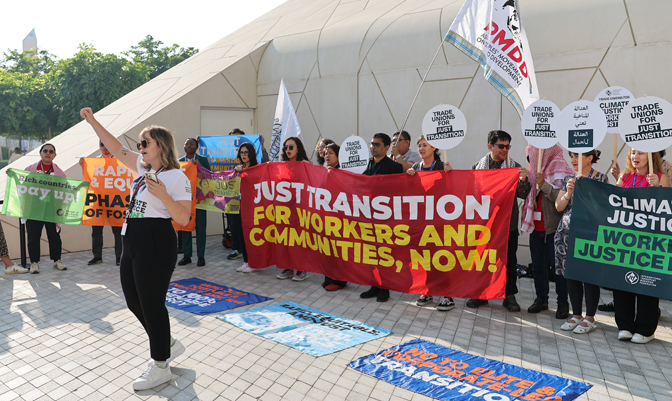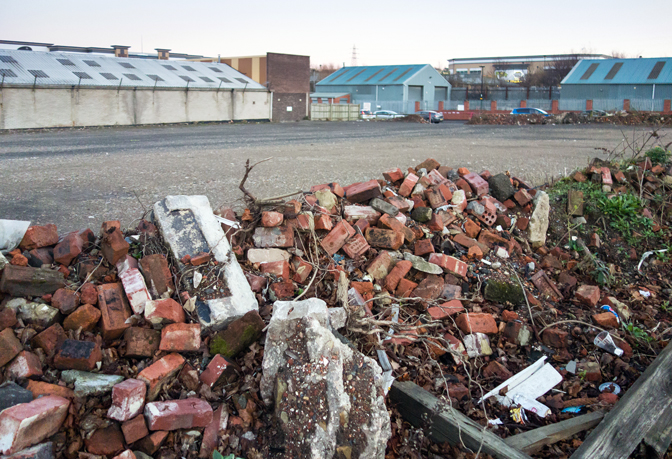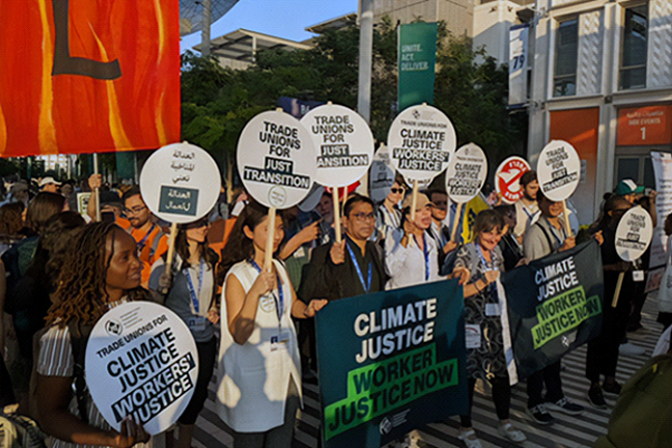
When Nissan announced on 24 November 2023 a £2 billion plan to build three electric car models at its Sunderland factory, there was widespread relief. The scheme could help preserve the jobs of about 6,000 workers directly, and thousands more across the UK. An additional new battery "gigafactory" with around 1,000 staff will also be needed, opening in 2025.
Unite general secretary Sharon Graham said the announcement “is fantastic news that secures the long-term future of the site and the thousands of skilled well-paid jobs it supports.” But she added: “For Britain to grasp the opportunities this transition presents – more and better jobs, a stronger fairer economy and net zero goals achieved – requires a bolder more comprehensive industrial intervention from government that puts workers front and centre.”
Public investment from the UK government’s Automotive Transformation Fund was key to the deal. But Unite says the “the fund is insufficient to ensure the UK automotive industry as a whole, on which countless livelihoods depend, is not left behind during the shift to electric vehicles.”
 INDUSTRIAL RUIN A funded plan should be in place to ensure phasing out old, dirty jobs doesn’t leave just rubble behind. But none of this will work unless the unions representing affected workers are fully involved.
INDUSTRIAL RUIN A funded plan should be in place to ensure phasing out old, dirty jobs doesn’t leave just rubble behind. But none of this will work unless the unions representing affected workers are fully involved.
Dirty industries are on borrowed time. The COP28 climate conference agreement, concluded in Dubai on 13 December 2023, called for the first time for a transition from fossil fuels.
But a plan to move from energy intensive 3D – dirty, difficult and dangerous – jobs to new, clean and green jobs should not treat workers in the old dirty industries as collateral damage, unions say.
Just transition
Just going green is not enough. What is needed is a just transition. The term, coined by unions a working generation ago, is now part of the UN’s standard language when negotiating industrial transitions for the sake of the environment. Global union confederation ITUC welcomed a Just Transition Work Programme included in the COP28 agreement.
ITUC general secretary Luc Triangle, commenting on the new deal, said: “Government climate negotiators have recognised that explicit reference to labour rights, decent work, quality jobs and social protection is necessary. However, sufficient financing must be delivered coherently and the ILO Just Transition Guidelines, agreed by tripartite discussions between union, government and employer representatives, need to be put into practice.”
In practice, proposed transitions can be less than just and may, if done without care and the necessary resources, introduce new health and safety risks at work.
Tata Steel’s plans to convert its Port Talbot blast furnaces to electric arc furnaces – with the blueprint and a subsidy of £500 million agreed in secret talks between the company and ministers – have been opposed by unions as neither just nor green. Unions fear 3,000 out of a total of 4,000 jobs could be lost and argue there are other ways to green the industry without losing well-paid jobs.
SAFE TRANSIT? A September 2023 just transition policy brief from the International Labour Organisation (ILO) warns the climate crisis “without proper controls in place, may increase the risk for injury, disease and death for workers due to heat stress, extreme weather events, exposure to hazardous chemicals, air pollution and infectious disease, among others.” More.
Emerging from talks in the rumbling dispute, a 17 November 2023 statement from the unions Community, GMB and Unite noted the Tata plan ignored “a credible and deliverable alternative plan to decarbonise steelmaking at Port Talbot which can make the business fully sustainable, avoid compulsory redundancies and safeguard the future for all the downstream sites.”
The statement added: “Today Community, Unite and GMB are putting forward a better plan – one that will protect jobs, lead an industrial revival and meet the UK’s commitment to net zero. It’s time for ministers and Tata Steel to step back from the brink, sit down with unions and engage with this serious plan to secure the future of steelmaking at Port Talbot.”
TUC general secretary Paul Nowak, describing the Tata plan as “a bad deal for workers, for the steel industry and for the country”, said: “A just transition to net zero can only be delivered with workers at the table. It is unacceptable that the steel unions were locked out of negotiations between ministers and Tata Steel about Port Talbot.”
An alternative plan for Port Talbot, presented by Unite to the Senedd Cymru – the Welsh Parliament – on 1 December 2023, would ‘create jobs not cut them,’ the union said, by introducing new technology while gradually phasing out the old.
Unite general secretary Sharon Graham said: “Unite’s plan for Port Talbot would ensure jobs are created not lost, provide a bright future for South Wales and guarantee the UK as a global leader in green steel production. As the country and the world transition to net zero, the demand for steel is growing – especially low carbon steel. So the question is not whether we will be using more steel – simply where it is going to be made.”
It is an argument backed by the TUC. It notes other countries are showing the alternative pathways that don’t trash communities and leave workers on the scrapheap.
The TUC notes that in Spain, Canada, Sweden, Netherlands and in the USA, governments and steel companies are investing in and building green hydrogen furnaces to produce primary steel. These are direct-reduced iron units that use green hydrogen instead of coal to extract iron from ore. It says “this is ambitious climate action, that benefits workers and communities rather than leaving them by the wayside.”
Working for a win-win
Unions argue that decarbonisation that sees jobs as an unavoidable casualty is unacceptable. But it is frequently the route taken. Closure of Britain’s coal mines in the 1980s saw a straight switch from pollution to poverty, with coal communities still blighted by unemployment and industrial decline.
In a July 2023 response to a UN Working Group on Business and Human Rights consultation on human rights in the extractive industries, the UK-based Institution for Occupational Safety and Health (IOSH) noted: “It is undeniable that extractive industries are critical to a human rights-based and just transition, but IOSH believes that awareness and action of occupational safety and health impacts remains poor among stakeholders, and this is an agenda that needs to be prioritised as part of a strengthened human rights-based approach.”
 BETTER WORK Unions at the COP28 climate conference made sure their message on a just transition was heard, which includes a Just Transition Work Programme. But it takes practical industry and government plans backed by investment and agreed with unions to make sure the locations of old industries don’t swap dirty jobs for desolation and joblessness.
BETTER WORK Unions at the COP28 climate conference made sure their message on a just transition was heard, which includes a Just Transition Work Programme. But it takes practical industry and government plans backed by investment and agreed with unions to make sure the locations of old industries don’t swap dirty jobs for desolation and joblessness.
Even where new green energies emerge, communities affected by this evolution in jobs are frequently not the beneficiaries.
Workers and the green-energy transition: Evidence from 300 million job transitions, a US National Bureau of Economic Research (NBER) working paper published in August 2023, found many of those displaced from dirty jobs move to other dirty jobs, non-green jobs or unemployment – fewer than 1 per cent get a green job. Others – usually younger and better educated – take up the new green jobs.
NBER concludes the green energy transition “could exacerbate underlying trends in labour market inequality. We find that workers without a college degree and older workers are significantly less likely to transition into green jobs, and more likely to remain in carbon-intensive jobs.
“The high rate of employment persistence within dirty jobs in some localities suggests that there may be limits to the extent to which local labour markets are
able to absorb the workers who will be displaced by the move away from fossil fuels.”
A transition is inevitable. The climate crisis itself is having a devastating impact on jobs and worker health and safety. But for sake of both people and the planet, the priority must be a fast, fair and just transition.
Winning a safe and just transition
Climate change poses a ‘multdimensional challenge to occupational health and safety’ the International Labour Organisation (ILO) has said.
A September 2023 just transition policy brief from the UN employment rights agency notes the climate crisis “without proper controls in place, may increase the risk for injury, disease and death for workers due to heat stress, extreme weather events, exposure to hazardous chemicals, air pollution and infectious disease, among others.”
ILO adds: “Numerous health effects on workers have been linked to climate change, including injuries, cancer cardiovascular disease, respiratory conditions, and effects on their psychosocial health. There has been an increase in the estimated number of deaths among the global working-age population due to exposure to hot temperatures.”
According to ILO: “Taking occupational safety and health (OSH) into consideration is critical to a just transition, as risks may arise not only due to processes or hazardous practices and materials used in the transition. While work processes that promote greener practices and avoid direct use of harmful chemicals may reduce OSH risks by reducing workers’ exposure to hazardous substances, other processes and materials may increase risks.
The UN body continues: “All jobs should be decent, safe and healthy. To ensure a safe and healthy environment for all workers, occupational safety and health policies represent an integral dimension of a just transition. Governments, in consultation with social partners, can ensure that occupational safety and health risk assessments consider new and emerging hazards and risks arising from greening processes and identify adequate prevention and protection measures based on the hierarchy of controls.”
This approach means the first priority should be elimination of risks, followed by their management and control, with personal protective equipment used as the last resort.
The policy briefing concludes: “Climate change concerns should become fundamental components of national occupational safety and health policy., programmes and practice. Urgent action is needed to protect the health of workers and the planet, while maintaining a resilient global economy, employment opportunities and decent work for all.
“Addressing the challenge of climate change and a path to decent work requires effective employment policies and appropriate climate change adaptation measures which are developed taking into account the fundamental principles of occupational health and safety.”
ILO notes a just transition “if managed well, creates decent work opportunities with a gender-sensitive approach, contributes to the elimination of poverty, and ensures just and equitable social inclusion on the way toward greener, resilient and climate-neutral economies and societies, while at the same time acknowledges uneven distribution of costs and impacts associated with climate change.
“Occupational safety and health is a core aspect of decent work and sustainable development, through safeguarding of the health of workers, their families and communities. Occupational safety and health also benefits employers by contributing to safe, healthy and productive workplaces. Consequently, it is an integral part and enabler of a just transition.
“This long-term process must proceed as fairly and inclusively as possible for everyone concerned in order to leave no one behind.”
Resources
Occupational safety and health in a just transition, Just Transition Policy Brief, ILO, September 2023.
Chemicals and climate change in the world of work: Impacts for occupational safety and health, ILO, July 2023.
ILO Guidelines for a just transition towards environmentally sustainable economies and societies for all, 2015.
The Role of Social Dialogue and Tripartism in a Just Transition towards Environmentally Sustainable Economies and Societies for All, ILO Just Transition policy brief, August 2022.
Guiding Principles on Business and Human Rights: Implementing the United Nations “Protect, Respect and Remedy” Framework, UN OHCHR, 2012.
Outcomes of COP28, UNFCCC, December 2023.
DYING JOBS
It was unions that popularised the phrase ‘there are no jobs on a dead planet’. They know the climate crisis can’t be ignored. Hazards editor Rory O’Neill looks at ways to move to green jobs, without swapping the deadly effects of pollution for those resulting from industrial desolation.
| Contents | |
| • | Introduction |
| • | Just transition |
| • | Working for a win-win |
| • | Winning a safe and just transition |
| • | Resources |
| Hazards webpages | |
| • | Deadly business |
| • | Climate |
| • | Biohazards |
